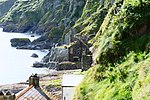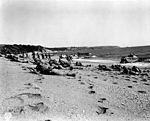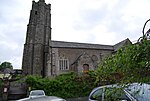Start Point, Devon
Devon geography stubsGeology of DevonHeadlands of DevonStokenham

Start Point is a promontory in the South Hams district in Devon, England, grid reference SX832370. Close to the most southerly point in the county, it marks the southern limit of Start Bay, which extends northwards to the estuary of the River Dart. The rocks of the point are greenschist and mica-schist, formed by metamorphism of Devonian sediments during a period of mountain building towards the end of the Carboniferous period. The name "Start" derives from an Anglo-Saxon word steort, meaning a tail. This root also appears in the names of birds with distinctive tails, like the redstart.
Excerpt from the Wikipedia article Start Point, Devon (License: CC BY-SA 3.0, Authors, Images).Start Point, Devon
Beesands, South Hams Stokenham
Geographical coordinates (GPS) Address Nearby Places Show on map
Geographical coordinates (GPS)
| Latitude | Longitude |
|---|---|
| N 50.221767 ° | E -3.641213 ° |
Address
Start Point Lighthouse
Beesands
TQ7 2EN South Hams, Stokenham
England, United Kingdom
Open on Google Maps











